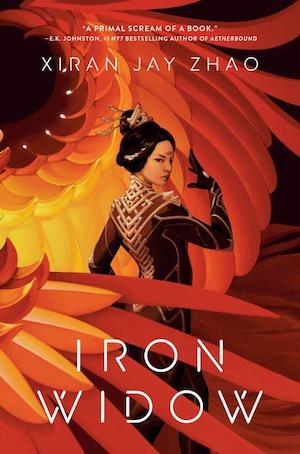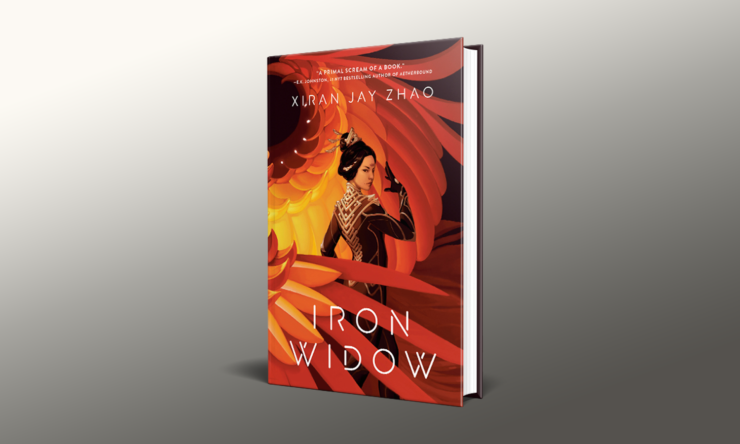There are few books out there that can compare itself to so many things that make my eyes go very big, but when someone tells me a new YA is like Pacific Rim, Neon Genesis Evangelion, The Hunger Games, and every webtoon novel out there, I immediately figure out how to get my hands on that book. Iron Widow does all this and more, re-writing Chinese historical figures as leading men and women in a drama that reaches far past its historical scope.
This book is a very slight reimagining of Empress Wu; an oft-demonized figure in Chinese history who became the nation’s only legitimate female sovereign. And when I say slight, I mean it: there are markers of Chinese politics, landscapes, and even other characters from history, but if you’re hoping for a more direct retelling of Wu’s life, Iron Widow is not that book.
This, however, does not lessen the impact of the book or author Xiran Jay Zhao’s vision. Zhao is doing something deliberate here, using a classical Chinese literary method to tell their story. As Zhao points out in the foreword, there’s a long tradition of using historical characters in fantasy novels, giving these history book men and women mythic status. They cite Investiture of the Gods, Journey to the West, and Romance of the Three Kingdoms as classic books that do exactly what they’re doing—picking out historical characters and throwing them into wild and wonderful situations just for the thrill of telling a good story. A modern Japanese example of this tradition of historical fantasy is Onmyōji, a series of books which helped inspire the much-more recognizable franchise…Pokémon.
All this is to say that if you go into Iron Widow expecting a political thriller lining up with Empress Wu’s recorded life starting as the concubine of Emperor Taizong, you might be disappointed. If you pick up this book hoping to be entertained by a sci-fi battlefield in a Chinese-inspired universe full of mechs, aliens, and ancient emperors-in-stasis, however, you will get exactly what you came for.
Buy the Book


Iron Widow
We follow Wu Zeitan as she begins her journey towards revenge. From the very first pages of this book we meet a character who is out for blood. She hopes to kill the boy who made her sister a concubine and, consequently, killed her while they were psychically linked together in a giant murder machine. When she’s selected as a concubine herself, she enters into the mechanical monster-mech, the Chrysalis Nine-Tailed Fox, and drops into a fugue state with the other pilot, the man who killed her sister. We’re going for less Gundam, more Zoid.
In the nebulous yin-yang world where the pilots’ consciousnesses exist during the battle, Zetian’s will overpowers the other pilot’s. She destroys him, uses his soul as a battery for the Chrysalis, taking over the Fox’s duties as it fights against the alien threat at the Huaxian borderland. And then the Fox docks, and Zetian emerges from the pilot seat, her sister’s murderer dead behind her, and laughs.
Wu Zetian rises out of the ashes of a dead man and realizes that his blood is not enough.
And then she gets paired with another man—Li Shimin—an alcoholic and a criminal who is the most powerful pilot in all of Huaxia. Zetian has to learn to live with Shimin’s strange behavior and bad reputation, all the while trying to figure out what it is about a Chrysalis that forces so many women to die within its piloting chamber. As Zetian and Shimin work together, they exploit their social image as murderer-heroes and their mech’s power to fight against the corrupt bureaucracy and the alien Hundun forces.
This book just keeps going. It’s genuinely a non-stop action novel, with romance, fighting, scheming, and everything you want from an anime…I mean a YA book. While a good amount of the technicalities of the world are swept under the rug, it’s not a huge detriment. There are giant, flying, transforming machines with different attributes according to the Chinese element system. There’s not a lot of worldbuilding that will make that more or less understandable. Iron Widow is a book that demands you take it seriously and without strings attached. You accept that this book is going to be off the wall and you’re just in for the ride. And it is, in fact, a wild fucking ride.
Even though Zetian is mean, unkind, and generally cruel, I was rooting for her the entire time. She was justified in her rage, angry at a system that forced her to be subservient even when she succeeded under all their oppressive rules. She is absolutely blinding, a character that comes across without apologies or explanations, and we love her for it.
There are a lot of binarisms within the worldbuilding that don’t feel in line with contemporary readers. I know that because of the deep ties to Chinese history and Confucianism the societal lines are pretty set in stone, but I didn’t feel like the book went far enough to examine the underlying misogyny and transphobia of these ideals. There’s some mention of it, and certainly Zetian has choice words about her own discrimination. This book does fine without addressing every single problem with Historical Patriarchy, but just as a warning to trans readers, the vibe might not hit. It is worthwhile to note that Iron Widow does challenge these stereotypes and the idea of fundamentalism within gendered roles, but it still feels jarring to read in the moment.
The book does attempt to point out that despite Society, women and men can both achieve greatness. The overwhelming misogyny and sexism Zetian (and all the women in Iron Widow) face is pretty incredible, and there’s not a lot of reasoning behind it except that Zetian lives in a society. This decision, paired with the fact that Zetian has almost no real female allies, if any, gives her a kind of cringe “not like other girls” syndrome. While that isn’t totally unexpected considering the historical Wu Zetian’s unprecedented power, and the nature of YA in general, it still wasn’t my favorite thing about this book.
This goes into my second sticking point about Iron Widow, which is entirely a throwaway opinion, and does not actually take away from my enjoyment of the book, but… I wish this were an adult novel. Already Iron Widow is at the upper end of YA; hundreds of women are forced to be concubines (and are subsequently systematically murdered) and consorts are made to marry their abusers, already setting up a weird High School version of Handmaid’s Tale. There are also torture scenes, an alcoholic main character, mentions of rape, on-page sexual assault, discussions of suicide, multiple on-page murders, and gaslighting throughout.
Zhao has mentioned before (on Twitter and in the foreword) that their original draft included even more of these subjects and was a much longer manuscript. I can’t help but wonder what Iron Widow would have looked like stripped of YA conventions, diving into the uncomfortable and horrific from other perspectives, showing a society in turmoil rather than just one girl fighting against the system. There’s nothing wrong with the novel tackling these subjects for a YA audience, and I greatly enjoyed Iron Widow in its current iteration. I only idly dream of the manuscript edited for an adult audience, one that might take on the challenges of history rather than repeating them.
But this is not a review of an imaginary book. Iron Widow was an incredible novel, fun and exciting, sometimes horrible to read, but in all the ways that make you fall in love with a character. The worldbuilding is imaginative and explosive, the strange mix of mecha battles and reimagined characters lighting up the fight scenes and adding a new mythology to historical fantasy. Zhao is an author who knows exactly what they want to do and will sometimes skip over worldbuilding to get there. This only adds to the wonderfully frenetic pace of the book, and will serve to keep you on your toes as you cheer for Wu Zetian, the worst, best girl as she goes forth to do her bloody, unflinching work.
Iron Widow is available from Penguin Teen.
Linda H. Codega is an avid reader, writer, and fan. They specialize in media critique and fandom and they are also a short story author and game designer. Inspired by magical realism, comic books, the silver screen, and social activism, their writing reflects an innate curiosity and a deep caring and investment in media, fandom, and the intersection of social justice and pop culture. Find them on twitter @_linfinn.










